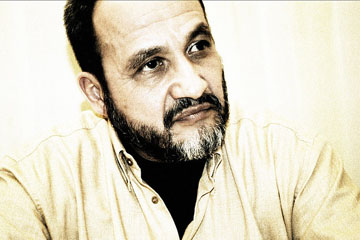
Francisco Mena Sandoval
“When you get involved in the process of struggle, you need to have a sense of dream. Later you see realities as you put your feet on the ground and see what is achievable.”
Francisco Emilio Mena Sandoval en español
Editor’s Note: We are double blessed: first to be personal friends of Mena’s son, Francisco, who arranged this lengthy trans-Atlantic Skype interview with his dad in Barcelona as well as translated for us; second that his dad agreed to be interviewed for our project.
During the country’s civil war the Salvadoran army considered Captain Mena Sandoval one of its most trusted and valuable commanders. They had invested heavily in his training as they groomed him into doing tasks, including ballot tampering, clearing the streets of undesirables, and making him aware of specific intelligence details of who was targeted to be assassinated.
These assignments were all preparing him for the final test of his military loyalty – an order to massacre an entire village, Villa El Rosario in Morazan. What the military did not factor into the equation was that all the training in the world could not remove Mena’s moral conscience.
Can you share why you chose to pursue a military career?
Life had its limitations living within a poor family in Sonsonate back when I was born on December 13, 1943. My dad, Manuel, died of diabetes when I was seven. My mom, Adela, had to take on both parenting roles while making a living. She was an incredible woman and all six of us children were greatly shaped by her presence but she was harsh in her punishments. In retrospect as an adult, I now recognize that I tended to adopt other males as father figures.
My dad’s absence adversely affected my childhood, resulting in a great deal of my emotional instability. This resulted in my going to juvenile detention centers and eventually being sent to military detention centers as a punishment. Instead it actually motivated me to see my future life in the army. I was always in good physical condition from running track and playing soccer. So I began to see the military as a feasible career path.
The other piece of it was I was interested in protecting the sovereignty of my country and its people. I’ve always been a person who thinks of people and values the rights of others, and I hope I never stop thinking this way! So joining the power circles of the military where I could have a positive influence in putting my beliefs into practice seemed to be a good career fit.
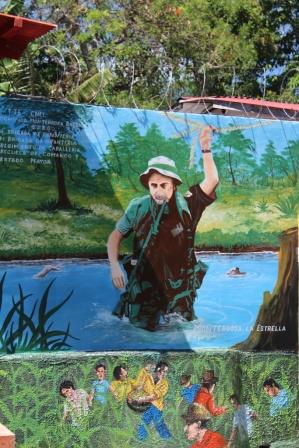
Complex mural depicting life in 1980s.
How did you reconcile your own absence as a father of three children when you were a career military man?
I feel very sorry that I wasn’t able to spend time with my children as I reflect on it knowing how I was impacted by the absence of my own father. The circumstances of the country dictated that something needed to be done. There was however, a presence of a strong woman, my wife, the children’s mother, for them, which is important to note. At the time the decisions needed to be made my wife and I talked. She told me to do what was necessary but not to put myself into a compromising situation. My brothers and sisters also had to leave the country. One brother was kidnapped by the army, one of the worst things that can be done to someone’s dignity. He was later released. Now we have continued our relationship having reconciled and made the best of it. All these things have led up to where I am now and have made me a better father, a better brother, a better uncle.
Have you had time to say to your family the things you consider important to say to them?
Yes, I am in constant communication with my children and my siblings. I travel extensively. Obviously I cannot make up for time I lost. But I try to make the best of the time we have.
You have been written about extensively by others. You also have written your own book. Is there something you haven’t said or said as sharply as you would have liked to have said?
My one brother who has since died suggested that I NOT include seven things in my book. He felt strongly that if I included those items, my political future would be non-existent and there would be a good chance that my family could never return to El Salvador.
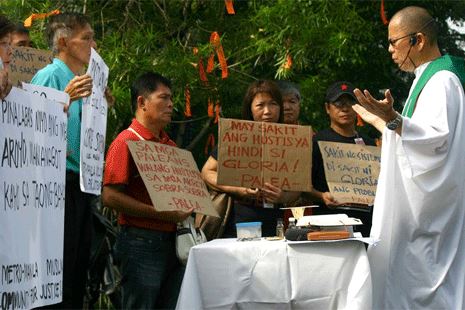
Father Robert Reyes leads the rally against a court order allowing Arroyo to travel. Nov. 16, 2011
You were highly trusted among the inner circle of those making decisions of who were on the list of “subversives” to be assassinated. Is it true you were not only aware, but were also warning people like the Jesuit priests of their fate?
Beginning in 1977, I was present at a lot of meetings of top generals, including Roberto D’Aubuisson [blamed for ordering Monsignor Romero’s assassination]. That first assassination affected me deeply. When I saw the names of twelve priests on the list to be killed without judicial proceedings, of course I spoke to Monsignor Romero to warn him.
I personally heard D’Aubuisson refer to the threat on Romero’s life as “Once the dog is killed, the rabies will stop.” Father Reyes whom I knew personally, had been the chaplain of the paratroopers. At first he was only captured. The second time they killed him. I knew these people personally and knew they were not subversives. A lot of my political and social formation came from the Jesuit community as well as one who died in Spain. Yes, I warned the Jesuits at the UCA what was being planned. At first the military placed bombs in the UCA library. I warned the priests of the date and location. I’m not sure they trusted my information until it happened exactly as I had warned. They called me and said, “Paco, it was true.” That strengthened the relationship and the intelligence I was giving them. I tried to convince them not to stay there. Only one priest survived that massacre of November 16, 1989.
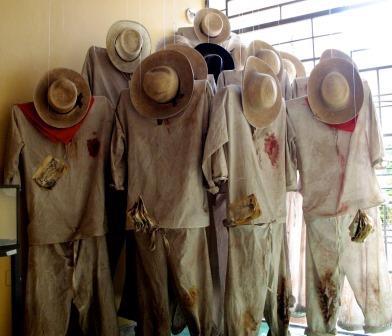
Jesuit University remembrance of the deaths of the poor.
What happened to you emotionally after the massacre of the Jesuit priests when you had done your best to warn them?
It affected me deeply. The army was so wrong in thinking their priests and Monsignor Romero were communists. Father Ellacurio had never picked up a weapon. They supported neither the FMLN nor the government. They never were in favor of conflict to solve social issues. They simply wanted a political solution and could see war was coming. Communism was merely an excuse to get involved between the East and the West.
Prior to that event you also took a leadership role in an attempted coup on October 15, 1979, of Salvadoran President Romero, considered an oppressive military dictator who was responsible for endorsing escalating violence. Can you share?
In the beginning I had a lot of power for a few days, being one of five involved in those efforts to overthrow him. I sought advice from Monsignor Romero. On reflection it was to bring about the foundation of democracy we have in the country now. We were all inexperienced and thought we could oversee things as a committee. However, we took different directions, and it never happened. [President Romero was deposed two years into his presidency.]
Where did your strong moral conscience originate?
I was raised with Christian values. I was lucky to have relationships with respected priests. Even though my mother had punished me severely as a child, she also wanted me to have good feelings toward others. It was difficult for me to justify what was happening in the military with their decisions versus what I saw happening in the country.
Describe some of the military assignments you were ordered to carry out and your reaction to them.
In 1972 I was ordered to carry out ballot tampering during the presidential election between Duarte and Molina. I did believe this was the right thing to do because the people had the right to democracy. Now I see it differently. At the time there was a coup working against that. I was an advocate for the government, required to reprimand their actions. You aren’t supposed to be involved in politics. It was clear that the opposition won but Communism was around the corner and we had to defend ourselves from it.
About the same time, in 1972 or 1973, we officers were ordered to take part in rounding up anyone resembling “hippies”—long-haired youth who were out at night. We captured them, brought them back to the bases to listen to our talks, and cut their hair to their scalps. This probably only generated violence.
Next I was named to be officer in charge of the National University to search for weapons and explosives. We never found any but destroyed a lot of the infrastructure there. I began asking myself, ” Why are we doing this?” and “What is my part in this? ” This is a university where we go for formation, a place of respect. I began to feel some disillusionment. I began to realize that I was in the army and it was not what I thought it should be.
Next, I was rewarded by being sent to the Air Force for seven years. I was aware of the assassination of Father Reyes. On reflection I see the army was trying to hook me into committing massacres. The security forces were leading repressions. There were actually two kinds of armies. I was sent to the School for the National Guard and saw the repressions being done, including assassinations of leaders in communities. I was trying to determine what was going on.
When did things reach their boiling point for you, and how did you handle it?
It was a gradual process in my thinking from the 1972 ballot box tampering and all the subsequent events really. So I was already doubting, in distress, in crisis. I could see the military was reeling me in to commit massacres. I remembered that Viet Nam officer who committed the massacre and was held personally responsible, and I said to them we can’t continue. They tried to court martial me later. It was clear they were asking me to kill people. I was carrying the weight of all the experiences.
I saw officers cut off the heads of people they captured, stick them on poles, and then fire at them just to make them more savage. I couldn’t bear to watch them let alone take part in them. These were everyday events.
During the war the Argentine officers convinced the Salvadoran officers that it was a political liability to be disappearing so many people. Instead, the Air Force began gathering up lots of union leaders and dropping them over the ocean in helicopters in a free fall for the sharks to get. So now the statistics were changing from disappeared to deaths. I witnessed this when I was in the Air Force.
Being ordered to carry out the El Rosario massacre in October,1980, was the straw that broke the camel’s back for me. [We don’t ask Mena to review the details of this event which we all know very well. Francisco shared those details in his story with us on p. 84 of Embracing El Salvador. They are well-documented in many books including Mark Danner’s The Massacre of El Mozote. In a nutshell, Mena was ordered to rid that entire community the night before the “Scorch of the Earth” movement to kill “guerrillas” who were not even present. He personally checked to find only helpless, starving women and children. He disobeyed orders knowing full well the ramifications of his actions. In risking his career and his life, his reputation was viewed by some as a traitor while others hailed him as a hero. There were 4,000 civilians and their descendents that can thank him for his decision. Those l,000 living in another small nearby village, El Mozote, were not so fortunate a year later on December 11, 1981, when another officer was given the same order and complied.]
What takes place in the minds of soldiers that reduces them to savagery for massacres such as you were ordered to commit or El Mozote?
This question doesn’t surprise me from a civilian viewpoint if you never lived in the army. This is actually well-defined in the army. The chain of command involves rigorous training. When a soldier is given an order, you follow it and that’s that. For example of how orders are carried out, if you are ordered to get 10 ladders and only three are available in the base, you go outside the base to find the other seven. There is no analyzing it, no excuses, no negotiating the order. You find a way. This is day in and day out. It is doctrine in Latin America to the common denominator. At the School of the Americas at Fort Benning, Georgia, where most of us trained, this is personified and taught in a very systematic way. You do not question; it is blind obedience. Everything is done through training and military by-laws. In Latin America whoever gives an order is responsible to carry it out. You can suffer consequences if you ask to see it in writing although legally you are supposed to be allowed to. They teach you to kill children because you are to see them as “potential” communists.
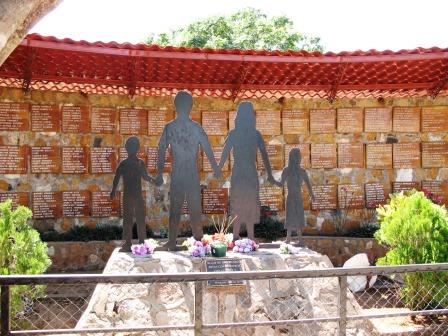
You witnessed so many heinous crimes. Are you haunted by survivor’s guilt?
I feel privileged to be alive. There were many times when death was right around the corner. We need to honor the lives of those who died, and we need to make sure that we don’t repeat those events so those things don’t happen again. When I attend a wake, I see strong images of many friends and guerrillas. I remember people I knew who lost their lives. I have to admit that it’s not unpleasant. I like it because it is a process that allows me to connect with all those people.
Did the military leaders really believe what they said about the priests being communists?
The vast majority believed it to be true. Anti-communism doctrine was instilled upon people on a daily basis. It was coming from the U.S. penetrating Latin America. Yes, they believed without a doubt that union workers, professors, students working for better conditions, pacifists, all these groups were considered to be justified deaths which the army had a role to attack. The death toll reached 30,000. They didn’t explain what communism was.
I was fortunate to have Romero in my life and know differently.
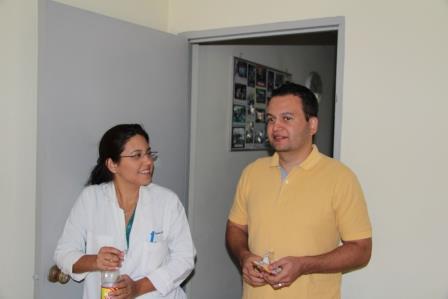
Mena’s daughter and son, Francisco
In January, 1980, at the age of 37, you joined the guerrilla movement during what should have been the height of your career as the military continued to spiral out of control with assassinations. What was happening for your family and you?
My wife and three children were living in exile moving from country to country for their own safety. Like all guerrillas we never used our own names in order to protect ourselves. My name was “Mahola,” and some of my friends here in Barcelona whom I knew from that time still refer to me by that name, which I find endearing.
After the signing of the Peace Accords in January, 1992, what happened in your life?
I was elected democratically for a three-year term as a legislator from 1993-1997. I began to question my role. In order to get laws voted in, you need to be involved in corruption, which didn’t interest me. I also had moral issues with this in terms of not wanting my children to be ashamed of their father.
I met different Jesuits from Barcelona who invited me to come study. Doing so was my intention, but I ended up staying to work on behalf of El Salvador on the development of women and youth, to make people sensitive to what happened to El Salvador, and to teach Latin American policies. I’ve been very involved in the struggles in El Salvador from a distance. I remain an active member of the FMLN movement here in Barcelona. I am not in exile. I choose to live here.
How do you see the direction of the Catholic Church going?
Here in Spain the Catholic Church has lost much credibility. Most of the students studying to become priests come here from Latin America. In El Salvador the church is very conservative and endangered because of decisions handed down from the Vatican.
On a personal level I have a lot of faith in a higher being, but I too, have lost a lot of credence in the formal church.
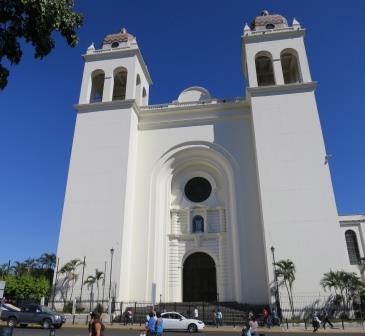
Cathedral in San Salvador
You are now 70 years old and have some health issues. What do you still hope to accomplish?
When you get involved in the process of struggle, you need to have a sense of a dream. Later you see realities as you put your feet on the ground and see what is achievable. I see myself still involved in the process. The fight is still going on. I see myself still very involved in what needs to be done and see myself being part of that for several years yet. I am in constant contact with government and party and am ready to get involved again with the process as much as an individual can get involved again. I see my personal life as needing to take care of myself. I wouldn’t change a thing I’ve done in the past. I’m happy with my children and how they’ve turned out. There is still much to be done to honor all those who gave their lives to the country.
Is there anything we didn’t ask you’d like to mention?
[We include you, our readers in this]– Thank you for your interest in learning about El Salvador and talking with so many other Salvadorans to learn about them. I’m very satisfied with my son’s work in interpreting for the U.S. people. It was actually through my son’s work that I learned about the other side of the U.S. after I left the war in 1992. The people I have met through him have shown other values and tremendous solidarity which differed from the official government policies I was familiar with. People are a country’s strongest commodities.
Your interest in being here shows solidarity and sharing the real values of the U.S.
[To Don – in jest – who also is 70] – We each have another 40 years of productivity to work for our country, right, my friend?


